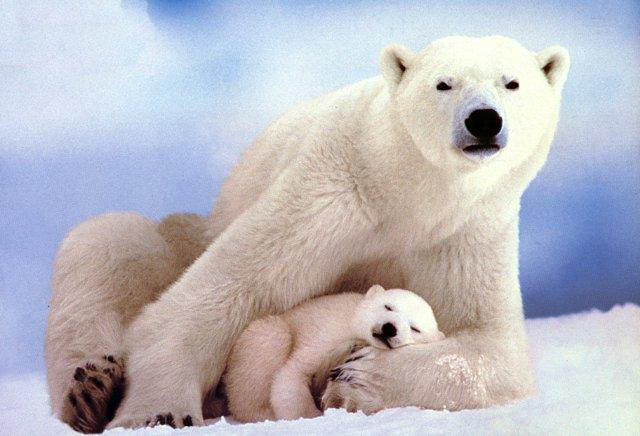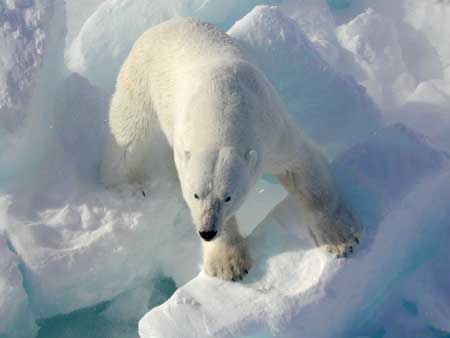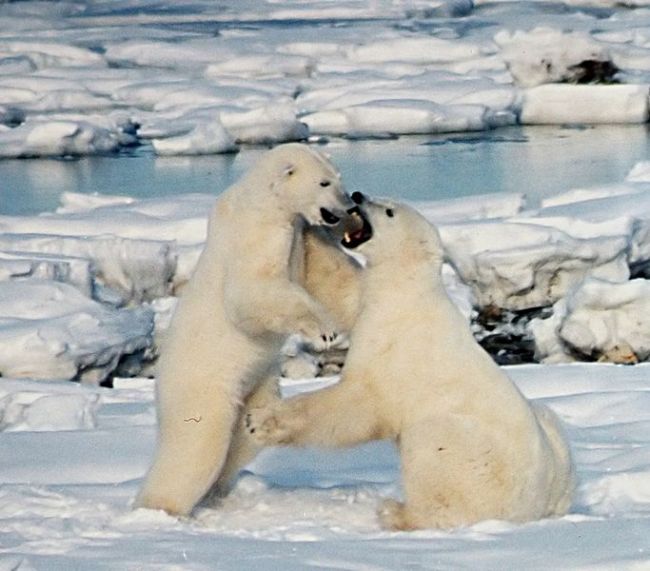| Irish Forums Message Discussion :: Polar Bears Irish emigrants. Polar bears origin from Ireland |
   | Irish Forums :: The Irish Message
Forums About Ireland and the Irish Community, For the Irish home and Abroad. Forums include- Irish Music, Irish History, The Irish Diaspora, Irish Culture, Irish Sports, Astrology, Mystic, Irish Ancestry, Genealogy, Irish Travel, Irish Reunited and Craic
|  
|
Polar Bears Irish emigrants. Polar bears origin from Ireland
 

|
|
|
| Irish
Author |
Polar Bears Irish emigrants. Polar bears origin from Ireland Sceala Irish Craic Forum Irish Message |
|
Limerick Queen
Sceala Philosopher
|
| Sceala Irish Craic Forum Discussion:
Polar Bears Irish emigrants. Polar bears origin from Ireland
|
|
|
This is really interesting news.
DNA tests have shown that Polar bears have their origin in Ireland.
Never would have guess that Polar bears were Irish emigrants.

Every Polar bear alive can thank the survival instincts of a ancient Irish brown bear Mother.
Amazing discovery at a cave in Ireland. The National Museum of Ireland held bones recovered in 1997 from the Poll na mBéar cave, which overlooks Ben Bulben in Co Sligo. These Irish bears have been shown to be the ancestors of all Polar bears.
Irish Times
Polar bears descended from extinct Irish female ancestors
Genetic profiles of bears around the world have been studied and show the extinct Irish bears were the female ancestors of all polar bears today. Photograph: Daniel J Cox/NaturalExposures.com/PA WireGenetic profiles of bears around the world have been studied and show the extinct Irish bears were the female ancestors of all polar bears today.

IRELAND CAN claim part ownership of a new and unexpected export – the polar bear. All polar bears alive today are descended from a common female ancestor, a now extinct Irish brown bear.
This is no extravagant claim from a Government seeking to talk up attractive export statistics. The discovery comes from an international team of scientists who compared the genetic profiles of bears from around the world.
The study looked at genetic material from more than 240 bears, both living and long dead, said research leader Prof Dan Bradley, of the Smurfit Institute of Genetics at Trinity College Dublin.
Samples from living animals were easy to collect for analysis but the researchers from eight countries, including Ireland, also studied ancient DNA retrieved from bones of extinct bears, he said.
The National Museum of Ireland held bones recovered in 1997 from the Poll na mBéar cave, which overlooks Ben Bulben in Co Sligo, Prof Bradley said.
These and other local samples yielded up bear DNA showing the extinct Irish bears were the female ancestors of all living polar bears that prowl the Arctic today.
“We found they were the closest species yet to polar bears,” Prof Bradley said. Details of the research were published yesterday by Current Biology.
Modern brown bears disappeared from Ireland about 3,000 years ago, but their descendants continue to live today in western Europe, he said.
The extinct bears, however, lived much earlier – 11,000- 38,000 years ago during the height of the last ice age, said Prof Pete Coxon of the department of geography at Trinity, an expert in Ireland’s glacial history.

The western seaboard near the Poll na mBéar cave would have been covered by 500 metres (547 yards) of ice and an ice shelf would have extended 30-40km out into the Atlantic then, he said.
Lead author Dr Ceiridwen Edwards of Trinity and later Oxford University produced mitochondrial DNA sequences using Irish bear bones from animals that lived as far back as 43,000 years ago. Mitochondrial DNA is genetic material only passed on from mother to offspring.
These sequences were compared with those from modern polar bears. The researchers discovered that bears living during the Ice Age between 11,000 and 38,000 years ago had mitochondrial DNA very similar to today’s polar bears, proving the genetic connection, Prof Bradley said.
Before this, the closest match was with brown bears living on Alaskan islands. “Our bears are much, much closer,” he said.
At some point during the last major Ice Age, more than 11,000 years ago, the paths of Arctic bears and the Irish bears would have crossed, allowing them to “hybridise” or cross-breed, the mating of related but distinct species. “This can happen at times of environmental stress,” he said.
It is happening now with polar bears increasingly encountering brown bears as the Arctic ice cover retreats, according to co-author Prof Beth Shapiro of Pennsylvania State University. Her DNA comparisons across all genetic samples showed polar and brown bears are cross-breeding in the wild today.
Not just Irish news papers claiming that Polar bears are Irish.
guardian.co.uk/science/2011/jul/07/polar-bear-ancestors-ireland
Polar Bears Irish emigrants. Polar bears origin from Ireland
Polar bear ancestors came from Ireland
Modern polar bears are partly descended from extinct brown bears that lived in Ireland during the last ice age, scientists have discovered
Polar bears have mitochondrial DNA found in the bones of ice age bears discovered in caves in Ireland. Photograph: Paul Souders/Corbis
It's a long way from the Arctic to Tipperary, but scientists have discovered polar bears can trace their family tree to Ireland. Genetic evidence shows they are descended from Irish brown bears that lived during the last ice age.
Modern polar bears share a distinct DNA sequence, passed down the female line, with their now extinct brown ancestors. However, the same DNA fingerprint is absent from other species of brown bear alive today.
It is thought the link arose from interbreeding between prehistoric polar bears and female brown bears when their paths crossed as the Irish climate cooled.
Scientists made the discovery after analysing DNA in mitochondria – energy-producing structures within cells – that are only passed from a mother to her offspring.
Dr Ceiridwen Edwards, from Oxford University, a member of the international team that carried out the study, said: "Hybridisation between ancient Irish brown bears and polar bears has led to the complete replacement of the original polar bear mitochondria. This maternal lineage is now present in all modern polar bears."
Polar and brown bears are hugely different in terms of body size, skin and coat colour, fur type, tooth structure and many other physical features.
They are also very distinct behaviourally. Polar bears, the world's largest carnivores, are expert swimmers which prey on seals, while forest-living brown bears climb and have a varied omnivorous diet. Yet the two appear to mate successfully whenever they come into contact.
Climate change is believed to have produced mating opportunities for the two species at various times in the past 100,000 years.
The scientists extracted mitochondrial DNA from the teeth and bones of 17 bears found at eight cave sites across Ireland.

Ten Irish brown bears from the ice age period between 10,000 and 38,000 years ago had the maternal DNA that is now seen in every polar bear.
Older pre-ice-age brown bears, dating to between 43,000 and 38,000 years ago, had a different genetic signature matching that of modern bears from eastern Europe.
Remains of the last ancient brown bears in Ireland, from 3,000 to 5,000 years ago, had yet another genetic fingerprint seen in modern western European bears.
Only the ice age brown bears carried the maternal genetic hallmark of polar bears.
Polar bears may have moved into what is now Ireland when the region was experiencing much cooler temperatures than it is today. At the same time, brown bears may have been pushed towards the coast by advancing ice sheets.
Warmer periods may bring the species together as melting glacial ice and rising sea levels force polar bears to retreat inland.
"Environmental conditions appear to have played, and continue to play, a big part in the evolutionary history of polar bears," said Edwards. "Today's warming climate is again bringing modern polar bears into contact with brown bears in places like Canada and Alaska." The research is published in the journal Current Biology.
Polar Bears Irish emigrants. Polar bears origin from Ireland
|
|
|
|
|
|
|
|
|
Irish Community Site MapIrish Message Site Map
Irish Forums Message Discussion :: Polar Bears Irish emigrants. Polar bears origin from Ireland � Sceala.com Irish Forums (Ireland) :: Designed In Ireland By Sceala The Irish
Message :: Irish Web Ireland :: Polar Bears Irish emigrants. Polar bears origin from Ireland From Sceala The Irish Message :: Irish
Forums
|











